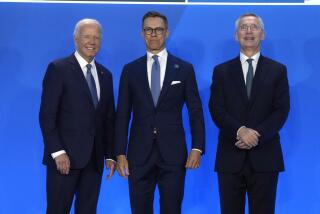U.S. Agrees to Back Baltics’ NATO Hopes
- Share via
WASHINGTON — President Clinton and leaders of the Baltic nations of Estonia, Latvia and Lithuania signed a pact at the White House on Friday that commits the United States to support the aspirations of the former Soviet republics to join the NATO alliance but leaves open the timing of such a move.
While the “Charter of Partnership” falls short of Baltic desires for quick alliance entry, the commitment is likely to remove the future status of the three countries as a potential stumbling block in the political debate over NATO enlargement.
As such, it is the latest development that heightens prospects for speedy Senate ratification of expanding the 16-nation North Atlantic Treaty Organization to include Poland, Hungary and the Czech Republic.
The Senate debate, which could begin as early as next month, constitutes the last important battleground for those opposed to Clinton’s controversial initiative to expand NATO eastward nearly a decade after the end of the Cold War.
The charter signed Friday in the East Room of the White House notes that the United States has “a real, profound and enduring interest” in the security and independence of the Baltic nations and declares U.S. support for their efforts to join NATO. The document also ties the United States to closer military and economic cooperation with the three.
“America’s security is tied to Europe, and Europe will never be fully secure if Baltic security is in doubt,” Clinton told the gathering. “NATO’s door is and will remain open to every partner nation.”
*
The charter commitments to Baltic security--coupled with the absence of any time frame for the three nations’ entry into NATO--is part of a delicate diplomatic balancing act by Clinton administration officials. They hope the pact will silence critics who argue that Baltic security has deliberately been avoided to prevent further agitating Russian concerns about NATO enlargement. The open-ended nature of the NATO-related commitment to the Baltic states was tailored to ease Moscow’s worries.
White House officials said Friday that Moscow was kept informed throughout the charter’s drafting.
Russia has strenuously opposed NATO enlargement, viewing it as an act of aggression by an alliance created almost 50 years ago to contain Soviet expansionism in Europe. While Russia has reluctantly acquiesced in the impending accession of its three former Central European satellite states, it has vowed to block attempts by any former Soviet republic to join.
In Moscow on Friday, Russian Foreign Ministry spokesman Valery Nesterushkin sidestepped a chance to denounce the charter but repeated Russian opposition to NATO enlargement.
Generally, Russia’s rhetoric toward NATO enlargement has softened in recent months, while its policy of persistent low-level harassment of its Baltic neighbors has also ebbed.
Despite the lack of a definite date for NATO membership in the charter, Baltic leaders left little doubt that they want consideration to come soon.
“Estonia understands that NATO enlargement to the Baltics will be the next big project of the alliance,” Estonian President Lennart Meri said. “We believe that the question of Baltic membership in NATO will become the real test of [new European] security thinking.”
Times staff writer Richard C. Paddock in Moscow contributed to this report.
More to Read
Sign up for Essential California
The most important California stories and recommendations in your inbox every morning.
You may occasionally receive promotional content from the Los Angeles Times.













